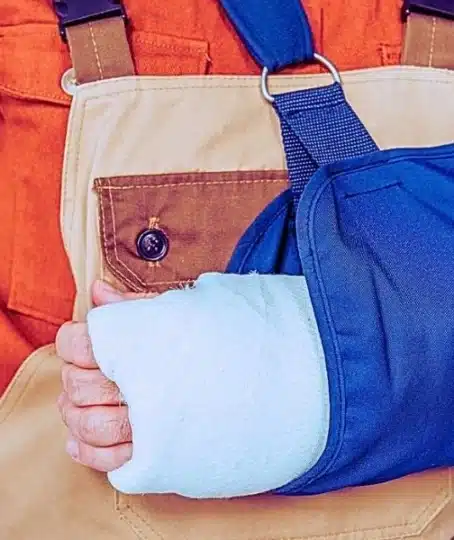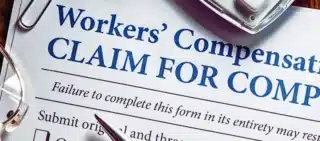
Common Reasons an Employer Won't Report Your Work Injury A total of 101,400 non-fatal work-related injuries and illnesses occurred in...


After an accident, you may need to know what to do after a construction accident. You should prioritize the safety of everyone involved, seek medical assistance, report the accident, and document your injury. Construction sites are one of the most dangerous places to work, and accidents can pose serious risks to workers’ health and safety. It is essential to know the correct steps to take immediately following an accident to ensure your well-being, and to pursue compensation for injuries.
If you need help with your injury claim, contact Strong Law Offices at (309) 393-2928.

Among the most common causes of workplace accidents are slips and falls. In 2021, the Bureau of Labor Statistics (BLS) documented 378 fatalities in the construction industry resulting from falls across the United States, and OSHA reported seven fall-related deaths in Illinois during the same year. Additionally, the BLS reported in 2022 that 423 deaths of construction workers were attributed to falls from heights, slips, or trips.
The steps you take following an accident could have implications going forward.
After an accident on a construction site, it's crucial to prioritize safety above all else. Amid chaos and uncertainty, the well-being of everyone involved should take precedence. Whether you're a construction worker, a supervisor, or someone passing by, it's important to understand why and how safety should be the primary concern.
It is important to promptly seek medical attention after getting injured on the job. Even if the injury seems minor, it is crucial to have a doctor examine you for serious underlying conditions. Delaying medical help could lead to avoidable complications.
Some injuries do not show immediate symptoms. Seek medical attention to ensure issues are identified and addressed early. Immediate medical attention is crucial for ensuring recovery. Furthermore, if a personal injury suit or workers’ compensation claim needs to be filed later on, having evidence of seeking medical treatment will be advantageous to your case.
Once you've addressed your immediate health needs, you should promptly report a workplace accident to your supervisor or employer.
Timely reporting of a job site accident is important for two reasons:
When reporting an injury, be sure to do so in writing and retain a copy. Provide a detailed account of what happened, as it can be useful if disagreements arise later on.
You should record your injury in writing and report it. This involves taking photographs of visible injuries, keeping a log of your symptoms, and recording witnesses to your injury. This record will be valuable if you decide to file a workers’ compensation or personal injury claim.
Be sure to take numerous photos of the accident site. If you weren't provided with the required safety gear, or the accident occurred due to employer safety violations, it's crucial to document this.
Don't forget to ask witnesses for their contact information, but be respectful if they are reluctant to share. Your personal injury lawyer can collect this information at a later time.
Maintaining copies of written communication with your employer is a good idea. Additionally, write down other interactions with your employer regarding your injuries or the accident, such as face-to-face discussions or phone conversations.
It's crucial to retain records related to construction accidents, as they often lead to severe injuries requiring ongoing medical care. Keeping thorough records of healthcare providers, medications, treatments, and medical expenses is essential for securing rightful compensation. With compelling evidence, you stand a strong chance of successfully pursuing a financial claim.
Construction accidents in Illinois are typically resolved based on legal principles of negligence or the Illinois Workers’ Compensation Act. Negligence claims are often filed against subcontractors, government agencies, architects, engineers, manufacturers, distributors, or general contractors.
Compensation for your construction injury can be obtained in various ways, including:
Defective tools and equipment are the primary reasons for construction site injuries. If the equipment was poorly manufactured, designed, or lacked sufficient warnings, you may have a product liability case.
Certain situations may warrant filing a personal injury claim, such as when the accident was deliberate or when your employer lacks workers' compensation insurance. When filing a personal injury claim, it is crucial to prove fault by showing that there was a duty of care, a breach of that duty of care, that the breach caused the accident or circumstances resulting in your injury or illness, and that the damages can be quantified in monetary terms.
If you sustain an injury at a construction site due to the negligence of a third party, you may be eligible to pursue a personal injury lawsuit. This enables you to seek non-economic damages for pain and suffering.
If you're considering filing a personal injury lawsuit, in many cases proving negligence may not be sufficient. In Illinois, there are strict limitations on suing your employer. Generally, you can only sue your employer for personal injury if they acted intentionally or did not have workers' compensation insurance. Illinois does not have a gross negligence standard like many other states.
The workers' compensation system is advantageous for workers because it operates on a no-fault basis. Therefore, even if you bear some responsibility for the incident, you are still eligible for compensation. However, one drawback is that the amount of compensation you can receive is limited.
Under workers' compensation, you can receive payment for the wages you have lost due to missed work and coverage for medical expenses and bills. In construction-related injuries, you may also be compensated for lost earning capacity. Workers’ compensation attorneys can help you with your claim. If the claim requires ongoing compensation, your attorney can advise you on how long workers’ compensation lasts. However, non-economic damages, such as compensation for pain and suffering, are not available in this type of claim.
After a job site accident, tracking your medical costs during your recovery is crucial. Keep a journal of how the accident affects your daily life. You may be entitled to compensation for ongoing medical care, pain and suffering, and medical care required due to the accident. Construction accidents often require ongoing medical care, treatments, and medications. Keep track of all your medical records, bills, and lost wages. A personal injury lawyer can help assess your claim and guide you through seeking compensation for your medical bills and lost wages.
Finally, following an injury on a construction site, it's important to prioritize your physical and emotional healing. This might include taking a break from work to relax and recover, and seeking professional support or therapy to deal with the mental impact of your injury. Look after yourself and concentrate on making essential personal progress. With patience and attention, you can overcome your injury and return to your regular routine.
Returning to work after a workplace injury can be a challenging process. Prioritize your health by following your doctor's advice. Communicate openly with your employer about your limitations. Consider seeking support from coworkers or mental health professionals to ease the transition. Patience and understanding are key to a successful return.
Constructions sites are one of the jobs with the most workplace accidents. Dealing with workers’ compensation laws and construction site accident cases can be intricate, and it's crucial to have the guidance of an attorney. It's important to avoid making unintentional errors or settling for less than you're entitled to.
If you have been injured in a construction site accident, contact us at Strong Law Offices to help you secure fair compensation.

Common Reasons an Employer Won't Report Your Work Injury A total of 101,400 non-fatal work-related injuries and illnesses occurred in...

At Strong Law Offices, we have a team of workers' compensation lawyers who understand the financial setbacks and physical limitations...

Common Equipment Involved in Run-Over Accidents Illinois job sites, from construction zones to industrial plants, depend on machinery to stay...